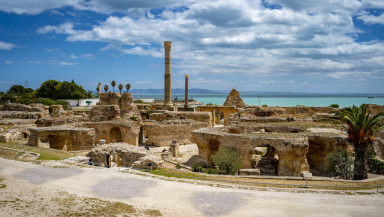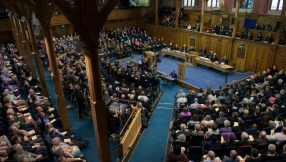
In the year AD 203, a young woman named Vibia Perpetua stepped into a Roman arena in Carthage, North Africa. The crowd jeered, wild beasts prowled, and death was certain. Yet she did not hesitate. She was 22 years old - a noblewoman, a mother, and by Roman law, a criminal. Her crime was her Christian faith.
Perpetua’s story has endured for centuries not only because of how she died, but because of how she lived - and the words she left behind. While in prison, she kept a diary, recording the deep tensions of her final days: the pain of leaving her infant son behind, the desperate pleas of her father to renounce her faith, and the visions that gave her strength.
'The Passion of Perpetua and Felicity', one of the earliest surviving texts written by a Christian woman, offers a rare and personal glimpse into the mind of a martyr.
Faith at the cost of everything
Perpetua’s story is often told as one of unshakeable courage - and rightly so. But courage is not the absence of struggle. In her diary, we see a woman who was fully aware of what her faith would cost her. She was not only giving up her own life - she was leaving behind a child who still needed her. Few choices could be more agonising.
Her father, a man who loved her deeply, visited her in prison, begging her to think of her family. He fell at her feet, kissing her hands, pleading with her to recant. “Daughter, have pity on my grey head! Have pity on your father if I deserve to be called your father!” he cried.
How easy it would have been to say the words that would save her life. Many did. Some Christians found ways to worship in secret, avoiding the consequences of defiance. Perpetua, however, refused. She knew who she was.
When asked if she was a Christian, she responded simply: “I am.”
That declaration meant everything. It meant she would die. But to deny it would mean something worse.
The meaning of victory
From a modern perspective, martyrdom can seem like a relic of the past, something from a world vastly different from our own. Yet Perpetua’s story raises questions that are as relevant now as they were in the third century. What does it mean to remain faithful when the cost is high? How do we hold on to conviction when it costs us relationships, security, or even life itself?
Perpetua’s writings reveal that she did not see herself as merely a victim of Roman cruelty. She believed she was engaged in a spiritual battle, a struggle not against wild beasts or Roman officials, but against something deeper.
In one of her visions, she saw herself transformed into a warrior, standing in an arena not to be devoured but to fight. “I understood that I should fight, not with beasts but against the devil,” she wrote.
This is the paradox of Christian faith: what looks like defeat is often victory. The Romans sought to humiliate and erase Perpetua and her companions. Instead, her witness inspired generations.
The account of her execution tells us that her faith was so powerful it moved even her captors. The prison warden who oversaw her confinement became a Christian. The hesitant Roman soldier who was ordered to kill her wavered - until Perpetua steadied his hand to guide the sword to her own throat.
The call to stand firm
Few of us will face the level of persecution Perpetua did. But her story remains unsettling because it reminds us that faith is costly. It is easy to follow Christ when it requires little of us. But what about when it demands sacrifice?
Perpetua’s world was one where following Christ meant losing everything - family, status, and life itself. Today, the challenges are different, but the call remains the same. Will we stand firm in our convictions when the culture around us calls us to compromise? Will we cling to our faith when we are misunderstood, ridiculed, or rejected?
Vibia Perpetua’s final act in the arena - guiding the executioner’s hand - was not an act of despair. It was a final declaration of trust. She had already given herself completely to Christ. Death was not the end; it was only the doorway to something greater.
Her story invites us to reflect on our own faith. Are we willing to live with the same clarity, the same resolve? To say, as she did, “I am a Christian” - and to mean it, whatever the cost?
“Who shall separate us from the love of Christ? Shall trouble or hardship or persecution or famine or nakedness or danger or sword? … No, in all these things we are more than conquerors through him who loved us.” - Romans 8:35, 37 (NIV)













